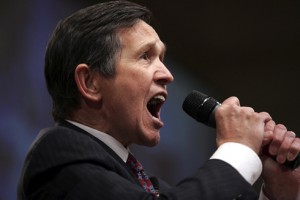 Dennis Kucinich, who expects his congressional seat in Cleveland’s 10th district to be eliminated when the state loses two U.S. House seats through redistricting, is spending the weekend attending several events in the Seattle area, one of several places the eight-term Ohio congressman is reportedly eyeing as he considers extending his congressional career beyond 2012.
Dennis Kucinich, who expects his congressional seat in Cleveland’s 10th district to be eliminated when the state loses two U.S. House seats through redistricting, is spending the weekend attending several events in the Seattle area, one of several places the eight-term Ohio congressman is reportedly eyeing as he considers extending his congressional career beyond 2012.
Kucinich, 64, told supporters in an e-mail last week that he’s received inquiries from supporters in twenty states across the country — from Washington to Maine — urging him to move and run for Congress in their districts.
Washington is presumably high on Kucinich’s list, mainly because it will be gaining a congressional seat through reapportionment. He also has a lot of friends and supporters there, many of whom supported his long-shot presidential campaigns in 2004 and 2008.
But he has other options. He could even try his luck in both states if he wanted to run in a new district in Ohio first, as the Cleveland Plain-Dealer’s Stephen Koff suggested a couple of weeks ago. “If he lost in Ohio’s March primary, he’d have enough time before Washington’s August 2012 primary to meet that state’s candidacy requirements, according to the Washington Secretary of State’s office,” explained Koff.
Kucinich, who has at least seven events scheduled in the Seattle area this weekend — speaking at a teachers’ rally Saturday morning, a fundraiser for the 46th legislative district Democrats in nearby Woodinville in the afternoon, three events Saturday night at the University of Washington, and a brunch fundraiser in Shoreline on Sunday — will wrap up his whirlwind visit to the state with a speech at Seattle’s Green Festival.
As extraordinary as Kucinich’s plan seems, it isn’t entirely unprecedented. As Koff pointed out in his May 4 article, Kucinich wouldn’t be the first congressman to move to another state to run for the same office. Republican Ed Foreman, who lost his House seat in West Texas in the 1964 LBJ landslide, later moved back to his native New Mexico and was elected to Congress from the Land of Enchantment in 1968, narrowly defeating Democratic incumbent E. Johnny Walker.
Foreman’s success, however, proved to be fleeting as he was unseated two years later, losing a relatively close race to Democrat Harold L. Runnels.
While a number of well-known politicians have established residences in other states to launch successful candidacies, as Koff mentioned, it’s rare that a sitting member of Congress — or a former member of Congress — has ever tried to do it in the middle or tail end of their political career.
One of the most fascinating examples of a politician who managed to pull it off successfully — and repeatedly — was that of James Shields, an Irish-born Union Army general during the Civil War who, before and after the war, served in the U.S. Senate from three different states — Illinois, Minnesota and Missouri. When the Illinois legislature refused to re-elect him, Shields moved to Minnesota and won a seat in the U.S. Senate there in 1858, becoming one of that state’s first two senators.
Failing in a bid to win reelection in Minnesota, the ubiquitous Shields — hopping across the country like a kangaroo — headed to California before eventually settling in Missouri. Incredibly, the 73-year-old Shields, in rapidly declining health, was elected to the U.S. Senate from that state to fill a short-term vacancy in 1879, but died shortly after his term expired.
During his long and varied career, Shields also served as the territorial governor of Oregon.
In 1974, the late Eugene McCarthy, intrigued by the example set by Shields, seriously considered following in the widely-traveled general’s footsteps. McCarthy, who had given up his Minnesota seat in the U.S. Senate four years earlier, toyed with the idea of running for the U.S. Senate from either New Hampshire or New York that year. He later added Nevada, where Democratic Sen. Alan Bible was stepping down, to his short list of possible states from which to launch a political comeback.
New Hampshire, which had propelled his insurgent antiwar candidacy in 1968 — and still home of the first-in-the-nation presidential primary — interested the witty and erudite McCarthy the most, but he eventually decided against it.
“New Hampshire can find its own candidate,” he caustically told reporters after a brief foray into the New England state.
Former California congressman John G. Schmitz also thought seriously about moving and running from another state after losing his Orange County seat in the U.S. House to a Nixon-backed candidate in 1972. Schmitz, who had garnered over a million votes as the American Independent Party’s candidate for president later that autumn, wanted to keep “several options open” and seriously considered moving to Idaho shortly after his term in the U.S. House expired in January 1973.
In fact, the former two-term congressman actually looked at property in and around Idaho Falls in the spring of 1973, prompting speculation that he might try to run for Congress from Idaho, but he, too, eventually decided against it.
It’ll be interesting to see what the gallivanting Kucinich — a hero to his party’s most progressive wing — decides to do. It should be fun to watch.



Pingback: Kucinich Rules Out Congressional Bid in Washington State